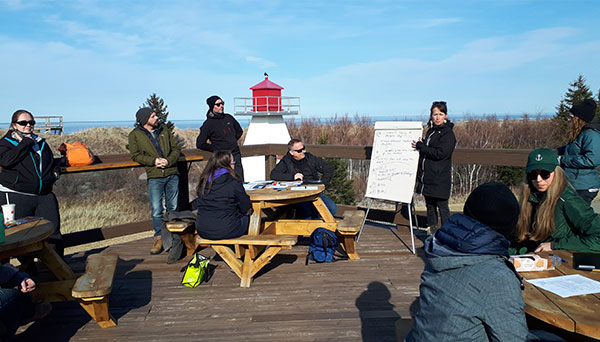From One Sea to Another: Building Community Coastal Resilience in British Columbia and Nova Scotia
Organization: Stewardship Centre for British Columbia
The mandate of the Stewardship Centre for British Columbia (SCBC) is to strengthen ecological stewardship by providing educational, technical and capacity programs and resources to organizations, governments, the private sector and the general public through collaborative partnerships.
Location: In British Columbia: Qathet Regional District, Comox Valley Regional District, Town of Qualicum Beach; In Nova Scotia: Municipality of the County of Pictou, Halifax Regional Municipality - Districts 2 and 11.
Communities directly affected by the project: Six rural/semi-rural sites (including Indigenous communities) in British Columbia and Nova Scotia.
Country: Canada
Other Organizations Involved: TransCoastal Adaptations (TCA) - TCA is a Centre for Nature-based Solutions at Saint Mary’s University that engages in research and partnerships to promote and undertake projects related to climate change adaptation.
 @ TransCoastal Adaptations (Danika Van Proosdij)
@ TransCoastal Adaptations (Danika Van Proosdij)
Background
The impacts of extreme weather events are being felt by a growing number of coastal communities in British Columbia and Nova Scotia as climate change increases the frequency and intensity of heavy precipitation and ocean storm surge events. Fortunately, communities can develop resilience to risks through conservation and implementation of nature-based solutions (NbS). Green Shores®, a program of the Stewardship Centre (SCBC), provides practical strategies to coastal communities to apply nature-based solutions– yet the program is under-utilized. In 2020, Eyzaguirre et al identified needs for increased implementation of Green Shores, including: 1) increased public awareness/education on nature-based alternatives; 2) more information about how to implement Green Shores; 3) increased access to expertise in shoreline project design using Green Shores. Since 2018, SCBC has been partnering with TransCoastal Adaptations: Centre for Nature-based Solutions to expand the Green Shores program to Atlantic Canada. The project serves to build upon the positive synergies that have developed and leverage the depth of experience of both organizations.
Goals
This project will provide decision-makers in the selected Nova Scotia and British Columbia communities with knowledge that can be applied to planning and action for climate change adaptation and shoreline ecosystem resilience.
Objectives
- Increase knowledge and skills by delivering Green Shores training in six under-served rural communities to develop resilient economies, improve environmental, economic and social performance, and contribute to sustainable development using the Green Shores.
- Increase the capacity of these communities to implement nature-based/ Green Shores techniques that will support conservation, sustainable use of biodiversity, and protection of ecosystems by facilitating a British Columbia/Nova Scotia network of community decision-makers through virtual meetings and events.
- Develop and deliver outreach and communications materials/resources on coastal climate impacts and support nature-based adaptation solutions for coastal communities in British Columbia and Nova Scotia.
Main activities
- Provide hands-on workshops to train community decision-makers (local government staff and elected officials, Indigenous community members, and shoreline residents) in Green Shores nature-based approaches to coastal resilience.
- Provide resources, technical advice, and peer-to-peer learning to coastal community organizations across a British Columbia-Nova Scotia Green Shores network.
- Develop outreach and communications materials based on community and project Advisory Community input to be delivered online (website, social media, webinars) and via print (brochures, flyers, infographics).
Outcomes
- Over 300 decision-makers have acquired the capacity to implement Green Shores nature-based shoreline solutions in their communities through participation in workshops (6 workshops on each coast).
- 20 meetings with a minimum of three Nova Scotia and three British Columbia communities will provide resources, technical advice, and peer-to-peer learning to coastal community organizations.
- Eight newsletters, 80 social media posts, 12 resource materials, and eight case studies will be developed and delivered to communities in British Columbia and Nova Scotia.
Community decision-makers are the project’s main beneficiaries and will include community leaders, Indigenous Peoples and youth.